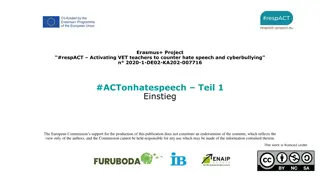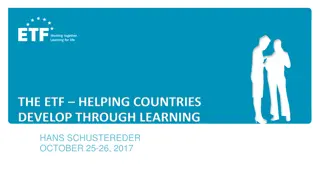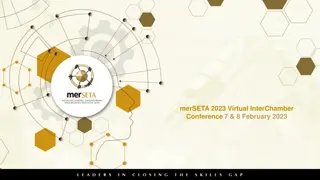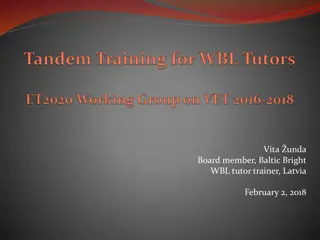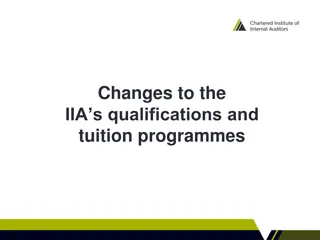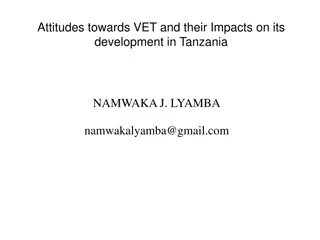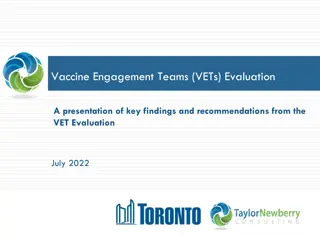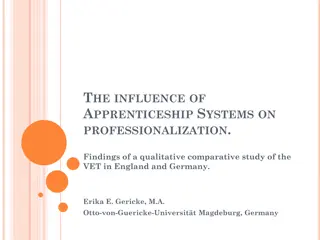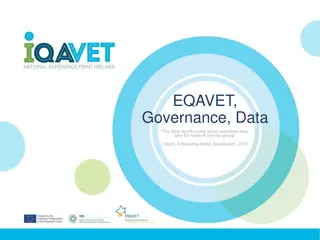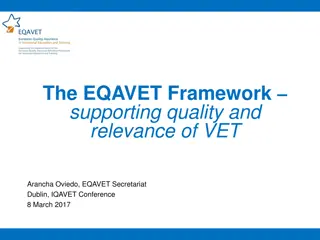Qualifications and Challenges of VET Teachers in Australia
Qualifications for VET teachers evolved from in-service degrees to Certificate IV level. Challenges include recruitment issues, lack of higher-level qualification evidence, and reluctance in supporting teacher qualifications by state governments and unions. Research aims to address quality problems in the VET system.
Download Presentation

Please find below an Image/Link to download the presentation.
The content on the website is provided AS IS for your information and personal use only. It may not be sold, licensed, or shared on other websites without obtaining consent from the author.If you encounter any issues during the download, it is possible that the publisher has removed the file from their server.
You are allowed to download the files provided on this website for personal or commercial use, subject to the condition that they are used lawfully. All files are the property of their respective owners.
The content on the website is provided AS IS for your information and personal use only. It may not be sold, licensed, or shared on other websites without obtaining consent from the author.
E N D
Presentation Transcript
Federation University Australia What makes a good VET teacher/trainer, and how do you get there? OctoberVET 2016, Ballarat Erica Smith, Federation University Australia
Australian Research Council-funded project 2015-2017 Would more highly qualified teachers and trainers help to address quality problems in the Australian VET system? Research team: Erica Smith, Keiko Yasukawa, Roger Harris, Jackie Tuck, Hugh Guthrie. . Partner Organisations: VET Development Centre, Australian Council for Private Education and Training, National Centre for Vocational Education Research, Federation Training, Queensland TAFE.
The job of a VET teacher/trainer in Australia Breadth and diversity of VET: industry areas, qualification levels, and teaching contexts and modes; Finding new markets; Training in industry workplaces; Interpreting Training Packages; Writing assessment tools; Regulation and compliance; Dealing with diverse learners; LL&N; Dealing with mental health issues among learners.
And yet The bronze medal? Compared with school teachers & academics . No name for VET teachers; Not a recognised career destination; Pay is often worse than the relevant industry; Hardly ever in the news; Until recently, no awards for VET teachers.
VET teacher qualifications Prior to mid-1990s most full-time TAFE teachers undertook in-service VET/adult education degrees. Advent of the requirement for a Certificate IV level qualification in1998; TAFE gradually stopped requiring degrees. Private training providers (4600) don t have any general requirement for VET-teaching qualifications. Now, only about 1000 people undertake higher education quals in VET pedagogy voluntarily, at around 10 universities. Representatives of these universities are members of the Australian Council of Deans of Education Vocational Education Group (ACDEVEG).
Whats been happening? Productivity Commission inquiry into the VET workforce 2011 cited: problems in recruitment of VET teachers; lack of evidence that higher-level qualifications for teachers improve quality of teaching; State governments, who employ TAFE teachers, are generally reluctant to support teachers becoming qualified, with money or time release; TAFE teachers union ambivalent; But . two States have higher pay points for degree qualifications o o So we thought we had better gather some evidence!
Pilot project 2013 with students (who are VET teachers) in university qualifications VET teachers find a higher-level qualification in VET pedagogy beneficial; The courses are flexible in delivery and teachers can study while working, basing assignments on their current situation; VET teachers report higher-order skills that would benefit their organisation. (Researchers: Smith, Hodge & Yasukawa Published in 2014)
ARC project : Research questions What differences do VET teachers levels of qualification (pedagogical and discipline-based) make to their teaching concepts, approaches & practice? What differences do VET teachers levels of qualification make to their ability to navigate complex training contexts, to teach a diversity of learners, and to achieve improved student outcomes? How do levels of qualification affect VET teachers engagement in further professional development activities and how can PD be tailored for different groups? How can more highly-qualified VET teachers contribute to improved quality in VET? What actual and potential barriers and facilitators are there?
Project method: Completed/still to do Preliminary focus groups with teachers (5 groups), students (6 groups) and 11 stakeholder interviews: What makes a good VET teacher? Case studies in four TAFE and four non-TAFE RTOs. Survey to investigate differences in teacher attitudes and practices by level of teaching qualification administered through 7 TAFE Institutes and c.40 private & enterprise RTOs. 574 responses. Analysis of professional development practices to see whether engagement is affected by level of qualification. In RTOs (six) and via external PD providers. Delphi exercise with two streams of stakeholders: policy people and senior TAFE/RTO managers; plus an international stream.
What makes a good VET teacher/trainer?
Students views about what makes a good VET teacher/trainer Four main domains: Professionalism (being organised, prepared and efficient); Expertise and standing; Matters relating to relationships with, and attitudes towards, students; and, of course, Pedagogy including assessment.
Students views about professionalism The students wanted a teacher who: Was well-organised, prepared for class (and on time) and seemed to enjoy his/her job; Was relaxed not stressed; Had a deep knowledge of the subject area and who was clearly still engaged in learning further about the field; (preferably) Was a full-time teacher not a part-timer or casual; Was able to establish clear rules for the classroom. In the morning you say, Oh wait, I have this teacher today, okay! Let s get out of bed and be on time, come on!
Students views of pedagogical skills and knowledge They wanted a teacher who: Did not waste too much class time on gossip and stories; Taught rather than getting the students to do the work; Could engage all students in learning, including those from diverse backgrounds; Set clear, and high, expectations; Set clear assessment tasks and taught to them; Returned assessment tasks on time with plenty of feedback It (assessment) can t just be like a walk in the park
Teachers views about what makes a good VET teacher/trainer Similar four domains different order Industry/ disciplinary expertise and standing; Pedagogical knowledge and expertise; Relationships with, and attitude towards, learners; Professionalism in the workplace. First of all [VET teachers] need to be an expert in the field that they re delivering. That s absolutely paramount
Teachers views of pedagogical skills and knowledge Taking account of learner diversity; Using adult learning principles; A range of teaching techniques; Creating an active learning environment where learners were not simply receiving knowledge. You've got a large number of hours, so diversity of message, diversity of mediums really helps.
Teachers views about professionalism Being well organised and prepared in their teaching; Managing the administrative tasks associated with their roles; Commitment to continuous improvement; The ability to represent their organisation to industry and other stakeholders; Integrity.
How do you get there? Findings from case studies about the value of qualifications One TAFE and one non-TAFE provider in each of four States. Pre-visit questionnaire, interviews with CEO or Deputy, central HR person, central learning and teaching person; and department heads, teachers and students in up to three departments: Traditional trade (e.g. carpentry, chef) Non-trade professional (e.g. nursing) Non-trade non-professional (e.g. business admin, beauty)
TAFE case studies: senior managers views Teachers with degrees in VET teaching had a greater appreciation of pedagogy and also of compliance matters; Teachers without degrees could not write good learning materials (needed ghost writers ) and could not write assessment tasks; Cert IV was not adequate; Qualification levels were important in recruitment and promotion decisions.
Examples of initiatives Encouraging teachers to take up HECS-free places at university studying VET teacher degrees. Managers could remember their own teacher-training cohort. Analysing student evaluations by qualification level of teacher. A pay point for which a VET teaching degree was needed.
Metro TAFE West: the difference. The difference is with a non-teacher trained teacher where there's issues, it's quite clear that they don't even understand what the issues are. When you're talking to them, they really have no idea about the design of their training, the design of the assessment and the delivery of it. With a teacher trained staff member, generally they'll understand the requirement for documentation, they'll understand much more about pedagogy, have much better classroom management skills and can deal much better with variations in student capability in a classroom they're much better equipped to analyse it and come up with solutions.
TAFE sites: Department Heads Nearly all preferred their teachers to have degrees in VET teaching: e.g. Solidifies learning; VET teacher-education courses seen as more practical than professional development. Stated advantages: up to date with teaching practices, a culture of teaching improvement, model lifelong learning, able to make a contribution more quickly, Disadvantage: (one- beauty) people may over-teach - at too high a level.
TAFE: Department Heads speak So it s a change in mindset if you want to raise the professionalism and the image of VET, the morale of lecturers and to be seen as professional, and to align themselves as a professional teacher. I think some of them rely too much on their industry knowledge here and it gets them by. (electrical) Someone with a degree is able to understand the concepts of how to structure content differently for each medium of delivery whereas someone with the [Cert IV] TAE has very limited knowledge . (service industries)
Non-TAFE RTOs: Senior manager views Mixed views. Very focused on compliance matters. Some favoured industry qualifications yet one noted lack of academic leadership which had led to the need to create a new position. Others talked about what higher qualifications brought e.g. critical thinking, motivation. Tended to talk more than TAFE managers about personal attributes of teachers. Two funded staff to undertake qualifications and this could include VET teaching qualifications.
Non-TAFE RTOs: Department heads Some dismissive of higher-level VET teaching qualifications. One thought that it was disloyal to be educated at university. Talked more about passion , meaning for the industry/occupation. Preferred people to have higher-level industry qualifications than teaching qualifications.
Department Head, Vocational Training National I was very young when I went through Hawthorn [the college which formerly provided university studies to TAFE teachers in Victoria], very immature and I thought it was just a bludge, a waste of time in some respects But I look back and it's probably a bit like an apprenticeship. I look back and go, I got things out of there that I didn't realise I was getting. I can't say the same about the TAE.
Early data from survey (n=574) Majority of teachers/trainers were aged 50 and over; One-third held concurrent positions outside VET, mainly in the area in which they taught; Spread across industry areas and jurisdictions; Type of RTO: TAFE 58%; Private RTO 30%; Community RTO 2%; Enterprise RTO 10%
Qualification levels Highest overall qualification Cert III or IV: 12%; Diploma/VET Grad Cert: 28%; Degree: 25%; Above degree: 35% Highest VET teaching qualification Cert IV TAE or earlier 64%; Dip VET or earlier: 17%; degree or above 19% Currently studying: Industry qualification: 26%; VET teaching qualification: 12%
Some interesting data Description of their role: Teacher or TAFE teacher 40%; Trainer 30% Identified more often as a teacher/trainer than with their industry occupation; More likely to undertake professional development in teaching than in their industry; PD was rarely all undertaken within work time, and was often self-funded
Level of confidence in teaching/training Using Queensland College of Teachers VET practitioner framework: In descending order of confidence: Know the content and how it can be taught. Assess, provide feedback and report on learning. Know learners, their context and how they learn. Plan, design and deliver effective teaching/training experiences. Engage with industry, community etc. 1. 2. 3. 4. 5.
Next steps Will analyse survey findings, including teachers written comments, by level of industry qualification, level of teaching/training qualification, and highest overall qualification Will take account of effects of industry/discipline area and type of RTO. Will feed back findings from all phases via the Delphi process
Contact details Erica Smith e.smith@federation.edu.au Australian Council of Deans of Education Vocational Education Group (ACDEVEG) http://www.acde.edu.au/pages/page51.asp Project web site http://federation.edu.au/research-vet-quality
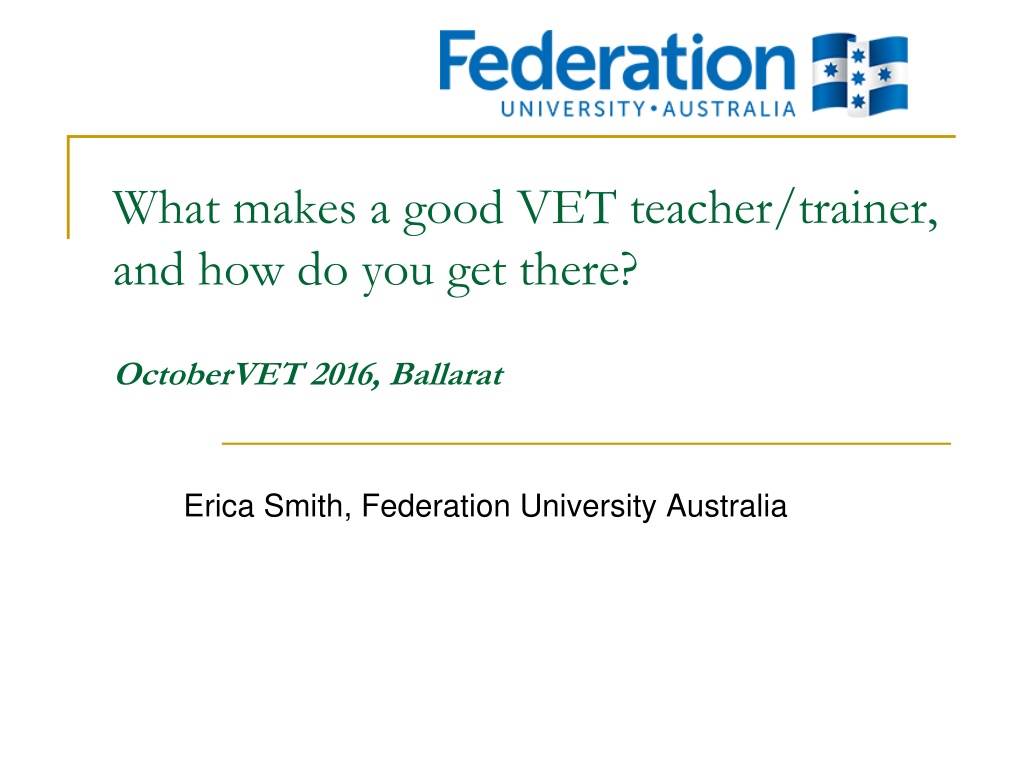
 undefined
undefined




